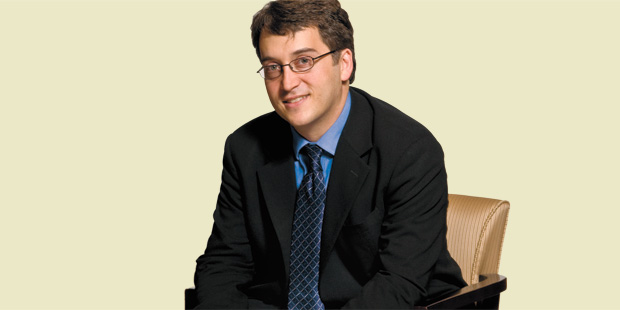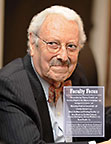Introducing Ryan Goodman
Anne and Joel Ehrenkranz Professor of Law
Printer Friendly VersionHis gentle voice doesn’t dominate a panel discussion, yet he’s the one to further the debate. He won three best-paper prizes at Yale Law School but forgot to mention that on his résumé. At Harvard Law School, where he has been since 2002, he asked a student to co-teach a workshop, whereas “most would say, ‘I’ll teach; you’ll be my T.A.,” recalls Andrew Woods, now a Hauser Doctoral Researcher, visiting from Cambridge University. And of the twenty-some articles and books that public international scholar Ryan Goodman, just 39, has already published, half are co-authored.
The word “ego” isn’t part of Goodman’s vocabulary. “He’s very unpompous, if you will, which is not an attribute that’s in great supply. He’s just interested in the scholarship,” says George Downs, professor of politics at NYU. “He’s more comfortable spreading the credit around,” says frequent co-author Derek Jinks of the University of Texas at Austin School of Law. “It isn’t about garnering attention for himself. He’s all about making the world better.”
A one-time debater and an interdisciplinary scholar who holds a Ph.D. in sociology as well as a J.D., both from Yale, Goodman specializes in human rights law as well as humanitarian law, and was director of the Human Rights Program at Harvard, beginning in 2006. “He’s had a lot of influence. His scholarship has informed a lot of brief-writing in court,” says Harvard colleague Jack Landman Goldsmith. The U.S. Supreme Court heavily relied on Goodman’s amicus brief in Hamdan v. Rumsfeld when it overturned the government’s system of military commissions in 2006.
He built bridges at Harvard between the law school and the John F. Kennedy School of Government, and intends to do the same at NYU, cross-listing his classes with the departments of sociology and political science.
“Ryan Goodman is a leader among an exciting new generation of scholars who combine cutting-edge social science Ph.D. work with deep expertise in international law,” says Benedict Kingsbury, Murry and Ida Becker Professor of Law. “His intellectual range makes him an exceptionally perceptive and constructive critic on the work of his academic colleagues, and a wonderful adviser to students.”
By all accounts, Goodman is a painstakingly careful and rigorous scholar who is attentive to prior interpretation and uses insights from sociology to frame the argument differently. “He takes his scholarship somewhere that you wouldn’t expect,” says Mindy Roseman, academic director of the human rights program at Harvard. One such example is “How to Influence States: Socialization and International Human Rights Law” (Duke Law Journal, 2004). Conventional wisdom in human rights scholarship postulates that countries are either coerced or persuaded to abide by particular human rights laws. Goodman and co-author Jinks, however, use existing sociological empirical studies to set forth a third reason—acculturation. That is, states tend to emulate their peers. “By identifying this mechanism of acculturation, we can better design human rights treaties to promote good practices,” says Goodman. He and Jinks are expanding this theme into a book, Socializing States: Promoting Human Rights through International Law.
Goodman’s passion for international law and human rights issues was born during his privileged upbringing in apartheid-era South Africa. When the Soweto uprising began in June 1976, he was just six years old. “We were pulled out of school, and I remember seeing tanks rolling down the street,” he says. He recalls that his family’s black gardener was routinely detained by the police, and that black families were separated. “We had people working in our home while their children were elsewhere. It shook me up,” he recalls. “It left an impression. I felt a sense of responsibility for correcting the imbalances of the world.”
In 1979, his dad, Basil, then an executive at General Electric, and his mom, Carol-Lee, a ceramicist, left much of their wealth behind to emigrate to the U.S. “They left out of a sense of justice,” he says. “They didn’t want their children [him and older sister Tanya] growing up with the negative and perverse influences of apartheid.”
They settled in Birmingham, Alabama, where, ironically, Goodman witnessed forms of racism “disturbingly reminiscent of South Africa,” he says. He rejected the Southern customs of ballroom dancing and debutante cotillions, but joined his high school’s debate team, ran track, and played soccer and football. With a debate scholarship to the University of Texas, he placed second in the national championship.
Graduating in 1993 with a B.A. in government and philosophy, as well as a growing interest in human rights, Goodman worked at a grassroots development organization in India. There he realized that he lacked the skills needed to effect social change, so he entered Yale, earning his J.D. in 1999 and his Ph.D. in 2001. Throughout his studies, he continued advocacy work in India as well as South Africa, and interned at the International Criminal Tribunal for the Former Yugoslavia.
Goodman had considered remaining single, fearing that “marriage would take time away from promoting human rights,” says Jinks. But then he met Melissa Bender, 36, an infectious-disease researcher. They married in 2006 and had Ella, now two years old.
The depth of the NYU Law faculty in Goodman’s area of expertise was a big draw. “Many places engage in superlatives,” he says. “But in terms of intellectual activity in international law, NYU is unbeatable.” He will jump right in alongside Philip Alston as cochair and faculty director of the Center for Human Rights and Global Justice.
Goodman is also looking forward to moving with his family to New York. “Ella feeds off the energy of the city, like we do.” His wife was born and raised in Manhattan. And an added perk: Goodman can attend meetings at the U.N., where they know not to underestimate the might—in Goodman’s case intellectual—of those who speak softly.
–
All of 2009 Faculty Focus


 Multimedia
Multimedia